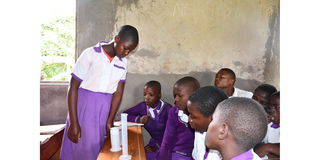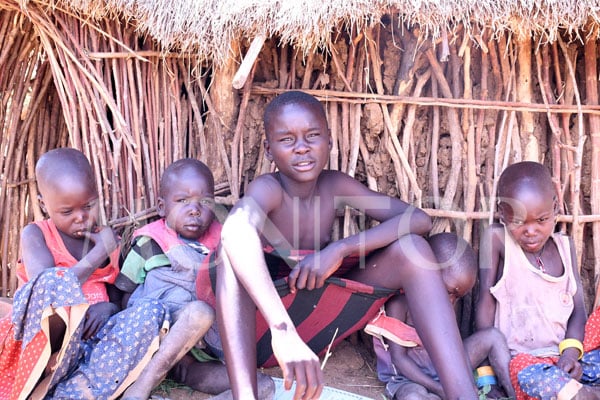Rural districts link improved PLE performance to free science kits

Pupils of Rweibaare Primary School, Mitooma District use a science kit during a lesson. PHOTO | RAJAB MUKOMBOZI
What you need to know:
- Ms Rose Helen Aboyo, the Head teacher Unyama Primary school in Gulu believes that as more schools in the region adopt the use of science kits in their classrooms, the hope is that the improvement in science education will continue to grow.
A section of District Education Officers (DEOs) and teachers from some schools in up country districts have attributed the significant improvement in the performance of their learners in the integrated science subjects to the distribution of free science kit by Ministry of Education and Sports and Riverflow Science Teachers Initiative.
During a meeting held in Kampala on February 20, the DEOs, headteachers, teachers and other educationists said that the initiative has helped to improve the performance of science among their children in rural areas.
Science subject was among the best done in the 2023 Primary Leaving Examinations (PLE), according to the results that were released by the Uganda National Examination Board (Uneb) earlier this month.
Mr David Bahati, the DEO Ntungamo said that schools like Kitunga Day and Boarding Primary School excelled in the district because of the science kits.
“Before receiving the kits, schools lacked resources for teaching science, but now students have access to modern equipment and teachers have been trained in effective kit use. The kits have led to improved test scores, deeper understanding of scientific concepts, and increased enthusiasm for science among pupils,” he said.
Mr John Talagaboine, the Assistant District Education Officer, Kibaale said the initiative is inspiring pupils in his district who could become the new generation of scientists and innovators in rural Uganda.
“The distribution of science kits manufactured by Riverflow Science Teachers Initiative, has led to a significant improvement of performance among schools in the region,” he said.
The initiative, started by enthusiastic educators, aims to provide high-quality science kits to underserved schools, offering materials for practical experiments in biology, chemistry, and physics.
The kits contain all the necessary materials and equipment for conducting practical experiments and hands-on learning experiences in science.
Mr Joseph Odeke, a teacher of science in Soroti said many rural schools in Uganda struggled to provide their students with adequate resources for learning science.
“Textbooks were outdated, laboratory equipment was scarce, and teachers often lacked the training and support needed to effectively teach science subjects,” he said.
Adding that, “Students now have access to state-of-the-art equipment and materials, allowing them to engage in interactive and immersive learning experiences. Teachers have also received training on how to use the kits effectively, enabling them to create engaging and dynamic lessons that inspire their students to explore the wonders of science.”
Other schools that performed well in science are; Unyama Primary School and Paicho in Gulu district, Gweri Primary in Soroti, and Bujuni in Kibaale did exceptionally well in sciences.
Mr Ojok Ben, a science teacher at Paicho Primary School in Gulu said pupils understand science as a subject better with practical sessions.
“Test scores have improved, and pupils are showing a deeper understanding of scientific concepts and principles. They are also more enthusiastic about learning science, with many expressing a newfound passion for the subject,” he said.
Ms Rose Helen Aboyo, the Head teacher Unyama Primary school in Gulu said, “By providing students with the tools and resources they need to engage in practical learning experiences, the initiative is helping to inspire a new generation of young scientists and innovators,” said
She believes that as more schools in the region adopt the use of science kits in their classrooms, the hope is that the improvement in science education will continue to grow.
Out of the 749,254 candidates who sat the 2023 PLE, 501,602 (66.9%) were pupils registered under the Universal Primary Education. Only 247,652 candidates were from non-UPE schools.




